
Social media significantly affects your body image and self-esteem, as it bombards you with unrealistic beauty standards and curated lifestyles that may not reflect reality. The constant comparison culture on social platforms can lead to feelings of inadequacy and insecurity, impacting how you perceive yourself. Likes and comments on social media can influence your self-worth, but it's essential to remember that they do not define your value. Implementing strategies like curating a positive feed and focusing on self-care can help combat the negative effects of social media on your self-image.
Social Medias Influence on Beauty Ideals
Exposing yourself to constant images of idealized beauty on social media can significantly impact your perception of beauty standards. As you scroll through your feed, you're bombarded with flawless faces, perfectly sculpted bodies, and curated lifestyles that may seem unattainable. These images often set unrealistic beauty ideals, leading you to compare yourself to these edited and filtered portrayals. The pressure to conform to these standards can take a toll on your self-esteem and body image.
Influencers and celebrities on social media play a significant role in shaping these beauty ideals. Their posts showcasing expensive skincare routines, designer clothes, and seemingly effortless beauty can make you feel inadequate in comparison. It's essential to remember that what you see on social media is often a carefully crafted persona, not a true reflection of reality. However, the constant exposure to these images can still subconsciously influence your thoughts on beauty and self-worth. It's crucial to curate your social media feed mindfully, following accounts that promote body positivity and diverse beauty standards to help counteract these unrealistic ideals.
Comparison Culture and Self-Worth
Constantly comparing yourself to others on social media can significantly impact your self-worth and overall sense of value. With the curated highlight reels that flood your feed, it's easy to fall into the trap of comparing your behind-the-scenes with someone else's carefully crafted facade.
This culture of comparison can lead to feelings of inadequacy, insecurity, and unworthiness. As you scroll through seemingly perfect images and posts, it's essential to remember that what people choose to share is often a polished version of reality. However, it's human nature to compare and contrast, and social media amplifies this tendency by providing a constant stream of content to measure yourself against.
This can create a cycle of negative self-talk and a distorted perception of your own worth. To combat this, try to limit your time on social media, curate your feed to include positive and diverse voices, and remind yourself that your value isn't determined by likes, followers, or comparisons to others.
The Role of Likes and Comments
Receiving likes and comments on social media can play a significant role in shaping your perception of self-worth and validation. The number of likes and positive comments you receive on a post may influence how you view yourself and your value in comparison to others. When you receive a high number of likes, you might feel a boost in self-esteem and validation, believing that you're accepted and appreciated by your peers. On the other hand, a lack of likes or negative comments can lead to feelings of inadequacy or self-doubt, impacting your self-image.
The instant feedback loop of likes and comments can create a cycle where your self-worth becomes intertwined with social media validation. Seeking validation through likes and comments may lead to a constant need for external affirmation, potentially affecting your self-esteem. It's essential to remember that likes and comments on social media aren't a true measure of your worth, and your value extends far beyond the digital realm.
Strategies for Positive Self-Image
Developing healthy habits and practicing self-care are essential strategies for fostering a positive self-image. Taking care of your physical health by engaging in regular exercise, eating nutritious foods, and getting enough sleep can have a significant impact on how you perceive yourself. Physical activity not only benefits your body but also releases endorphins that boost your mood and overall sense of well-being. Additionally, practicing self-care routines such as meditation, journaling, or simply taking time for yourself can help you cultivate a more positive self-image.
Another effective strategy for promoting a positive self-image is to surround yourself with supportive and uplifting individuals. Building strong, healthy relationships with friends and family who appreciate you for who you're can bolster your self-esteem and provide a sense of belonging. Positive social interactions can counteract any negative effects of social media on your self-image, reminding you of your worth beyond online validation. Remember, it's essential to prioritize self-love and self-acceptance in your journey towards a positive self-image.
Conclusion
Overall, social media can have a significant impact on your body image and self-esteem. The constant exposure to unrealistic beauty standards, comparison culture, and validation-seeking through likes and comments can contribute to feelings of inadequacy and low self-worth.
It's important to be mindful of how you engage with social media, prioritize self-care, and focus on building a positive self-image that isn't dependent on external validation.




